CDR Supporter Volunteers in Bali to Help Street Dogs
Local DC resident and CDR supporter Elizabeth Theran had an opportunity to volunteer with a Dog Rescue in Bali for two weeks. She was kind enough to share her experiences with the CDR blog.
“Nothing prepares you for this.”
Back in the fall of 2013, I needed to escape. When I saw an ad for a two-week yoga program in Bali, I thought, “perfect!” Because I donate to WSPA (World Society for the Protection of Animals), I was aware of their “Collars Not Cruelty” program that operates rabies vaccination programs around the world, and I had heard of their work in Bali. I also knew that there were some local nonprofits working with Balinese street dogs, and I figured a trip to Bali would be the perfect opportunity to practice some yoga and get in some volunteer work with the dogs while I was at it.
I quickly learned that Bali is, in short, a tough place to be a dog. The reasons are many:
- As in many countries in Southeast Asia (and elsewhere, for that matter), the dog culture there is radically different from what it is here in the States or in other Western countries. Although Indonesia does have some animal cruelty laws on the books, they are so obscure that almost no one knows they even exist. Moreover, the Indonesian government has an unfortunate reputation for corruption and selective legal enforcement.
- Some people do keep dogs as pets, but traditionally the Balinese believe that dogs belong outside and free-roaming. Because the traffic situation in many parts of Bali has worsened considerably over the last decade, with more and more motorbikes in the street and people riding them at breakneck speed without traffic lights, dogs are often hit by cars or motorbikes and suffer grievous injuries. Generally, people do not stop to help injured dogs, as the lives of “stray” dogs are not valued.
- Many people do not seek veterinary care for their dogs, even when they can afford it or it’s offered for free. Thus, easily treatable diseases and conditions like scabies or demodex run rampant, and injuries don’t heal properly. Bali dogs are generally not spayed or neutered either, and, as a result, there’s a constant stream of unwanted puppies. Female puppies are considered particularly undesirable because they themselves will produce more puppies, so they are often dumped on rubbish piles or at local markets to fend for themselves. People will also dump dogs who have become unattractive or smelly due to disease, or dogs they simply do not want anymore.
- Speaking of disease, Bali hosts innumerable viruses and other microbes that are unknown in the Western world. Young and vulnerable animals can become sick and die extremely quickly from conditions that do not exist elsewhere. As the indomitable Ebony, the Australian clinic manager at BARC’s Good Karma clinic in Ubud, told me, “You think, you’ve worked in rescue before, you’ve seen it all, you’re prepared. Nothing prepares you for this.”
- It has become fashionable in Bali to own a Western breed of dog like a Golden Retriever or a Pekinese rather than an indigenous Bali dog.[1] People purchase the Western (or pseudo-Western) dogs at animal markets in deplorable conditions, then plan to breed them to make money. These breeds do not fare well in the hot, frequently humid Balinese climate (neglect doesn’t help), and soon they become sick like many of their Bali-dog counterparts. But their owners will keep them perpetually chained or locked up in the hopes of being able to breed them.
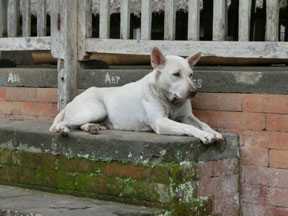 Dog on temple steps in Tenganan, a traditional Bali Aga village.
Dog on temple steps in Tenganan, a traditional Bali Aga village.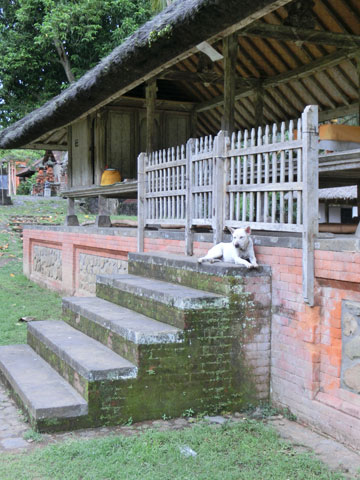
- Despite the best efforts of WSPA and local rescues like BARC, BAWA, and Villa Kitty, there is still rabies in Bali. The Balinese government mostly chooses to address the problem via mass poisonings of dogs, particularly in advance of high-profile events like the Miss World pageant in September 2013 and the APEC summit in October 2013. Although the government had a rabies vaccination partnership with BAWA for several years, in September 2013 the government shut down BAWA’s clinic operations, with very little explanation. The closure of BAWA’s clinic and shelter has put a tremendous amount of stress on the other local rescue groups.
- There is also an active dog-meat (“RW”) trade in Bali, and the dog meat restaurants generally source their fare from street dogs (notwithstanding the potential for rabies). Because most people don’t keep their dogs inside, it’s very common even for people’s beloved pets to vanish in the middle of the night, never to be seen again. While the Balinese traditionally believe that dog meat cures certain ailments (one Balinese gentleman told me that black dog soup is the best cure for asthma, but “only the black ones”), there has been a recent uptick in Western tourists on “extreme food” trips wanting to try dog meat as well. Dogs are also sacrificed in some religious rituals.
My Volunteer Experience
I had been planning to volunteer with BAWA, but their clinic was shut down about two months before I arrived in Bali. As a result, I brought donations for BAWA (their work is ongoing and desperately needed, but is more decentralized without the clinic), but I decided to volunteer with BARC at their Good Karma clinic in Ubud. BARC requires that all volunteers who will have contact with dogs receive the preventative series of rabies shots before arrival, and I had duly had all three shots before I left the U.S. When BAWA operated its clinic, it had the same requirement.
I was not the typical BARC volunteer: for one, most of their volunteers are able to commit more time than I could, usually volunteering all day for weeks at a time. (It helps if you’re Australian or European and get loads of vacation time, so you can spend a month or more there!) I was only in Ubud for nine days, and I had my yoga classes to attend, so I could only show up around lunchtime most days. By then, most of the “dirty work” of feeding breakfast, cleaning cages, and so forth was already done. (I felt extremely guilty about this.)
That said, there was plenty for me to do. The dogs at the clinic are in desperate need of positive human contact, since many of them arrive either feral or having had very bad experiences with humans. I would spend hours out on the back verandah with dozens of dogs running around me playing with each other, getting into trouble, and jostling me for pats and attention once they realized there was a sucker in their midst. I also helped give medication to some of the dogs, including coconut-oil massages for the dogs who had lost their fur to parasites to help their skin recover. One day I volunteered in the stockroom, sorting donations and other supplies. (I will confess that the air conditioning in the stockroom was a welcome respite, given that the rest of Ubud pretty much has little to no air conditioning. This was rainy season, so it was at least 90 degrees and 99 percent humidity most days if it wasn’t actually pouring.) I also walked a couple of dogs, not an easy feat in Ubud where the sidewalks are in terrible condition and the traffic murderous.
As the folks at BARC make clear to potential volunteers, volunteering with an animal rescue in Bali (or any non-Western country) is significantly different from volunteering back at home. They do their level best to keep conditions clean and sterile (where necessary), but there are some days where BARC’s clinic has little or no running water, and supplies are always short. Particularly in rainy season, when there is mud everywhere, this can be a real challenge. Rescues are frequently and chronically understaffed, so everyone “pitches in” wherever the need is greatest. Also, some dogs arrive in heartbreakingly poor shape, with conditions that mostly do not exist in the West anymore, and not all of them can be saved.
When my friends and family found out I was going to be volunteering with dogs in Bali, their first response was, “uh oh, you’re bound to be coming back with a dog.” They need not have worried, as the Balinese government has banned all animals from coming into or, more stringently, leaving Bali, ostensibly due to rabies prevention. I did fantasize about slipping one or more into my suitcase, though! There was Pinkie, who never failed to stick her snout under my arm for more pats; sweet Muzzie, who was incontinent and missing a hind leg due to a bad traffic accident, but loved people and was always in search of attention; shy Yogi, so named for walking around on her two front legs in a perpetual yogic arm-balance (she had also been hit by a car–you can see her amazing “walk” here; big Willie, who had been hit on the head with a hammer and was dog-aggressive but constantly wanting human interaction, and so many more.
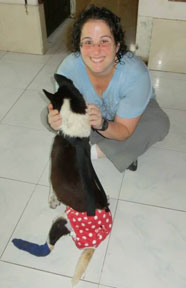 Me with Muzzie, modeling her incontinence bloomers that allowed her to scoot around the lobby freely.
Me with Muzzie, modeling her incontinence bloomers that allowed her to scoot around the lobby freely.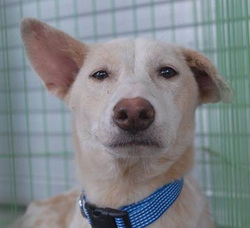 My beautiful friend Pinkie. If anyone was at risk of being stuffed in my suitcase or passed off as an infant in arms on the flight, it was she.
My beautiful friend Pinkie. If anyone was at risk of being stuffed in my suitcase or passed off as an infant in arms on the flight, it was she.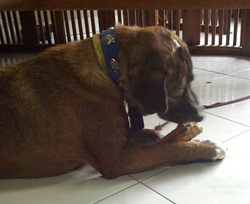 Willie enjoying one of my own dog’s rejected chew treats.
Willie enjoying one of my own dog’s rejected chew treats.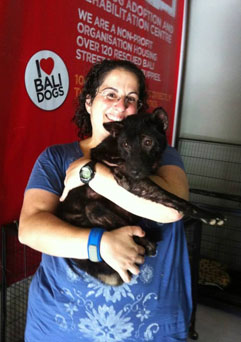 Me with Yogi, the dog who walked on her front legs. See her in action.
Me with Yogi, the dog who walked on her front legs. See her in action.
One day toward the end of my stay, I was there when Ebony came back from a day in the field, bringing with her two new arrivals. One was a filthy little terrier who was basically feral and had to be tranquilized in order to treat him. The other was a little bald puppy who yelped with terror when she was transferred from her transportation kennel to her crate in the clinic. She was dirty and exhausted, and almost immediately fell asleep with her rump hanging into her full food bowl. I got to name her, and I picked “Wendy” in honor of my own beloved vet, Dr. Wendy Knight at City Paws Animal Hospital, who generously sent a large number of medical donations with me to take to Bali. By the time I left about three days later, Wendy was perking up and already looked much better. It was hard to leave her, but I knew she was in the best of hands.
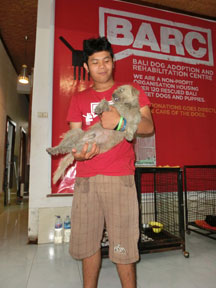 Mudja, BARC’s incredibly gifted “dog whisperer,” with the little terrier on intake.
Mudja, BARC’s incredibly gifted “dog whisperer,” with the little terrier on intake.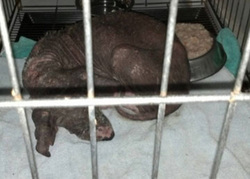 Wendy on her arrival at BARC, rump in her food.
Wendy on her arrival at BARC, rump in her food.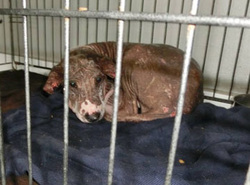 Wendy two days later, with her eyes open!
Wendy two days later, with her eyes open!
Dog-loving friends of mine here at home asked me how I could possibly stand being surrounded by all the canine suffering in Bali. My answer is that it was very hard in some ways, but volunteering at BARC helped tremendously. Seeing how dedicated they are to caring for these dogs, and their amazing before and after pictures of the dogs they’ve rescued, made it all worth it.
How to Help
As with any rescue group, all of the Bali-based nonprofits rely on donations, and financial donations are always welcome. These groups have other needs too, though, and regularly post “wish lists” for tourists coming to Bali. BAWA wish list; BARC wish list. What they suggest is that tourists make use of the extra-generous luggage allowances for long-haul flights (mine was two 50-lb checked suitcases for free), fill as much available space as they have with donations, and then have plenty of room in their luggage to bring back purchases from the trip. This worked out really well for me. If you’re going to Bali, or know someone who is, I suggest doing the same. (It’s really cost-prohibitive to ship in-kind donations to Bali, especially from the U.S.)
One specific need I discovered—for some reason it’s not listed on any of the “wish lists,” but it’s very real—is for digital cameras. The rescue groups frequently need to document conditions they see, and they also do field work in areas outside of Bali, such as Lombok and the Gili Islands, where they need to show folks back in Ubud what they’re dealing with. If you have a used digital camera, no matter how simple or “obsolete,” BARC and BAWA could really use it! CDR is now running a used camera drive to benefit BAWA, so you can bring your used camera to City Dogs Daycare at 1832 18th St. NW. CDR will forward all donations to BAWA’s administrative office in NYC, which will then send them on to Bali.
These groups are also in desperate need of fosters in Bali for the animals they rescue. This was always the case, but since the closure of BAWA’s clinic the situation has become acute. Obviously, this won’t be an option if you’re coming very short-term or staying in a hotel, but if you (or anyone you know) live in Bali or are planning to stay longer (even as little as a month), you could really help out and save a life by agreeing to provide a home to one or more dogs until they can be adopted out.
Elizabeth can be reached at eetheran@ gmail.com
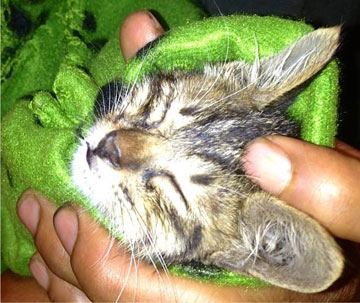 A rescued kitten (BAWA image)
A rescued kitten (BAWA image)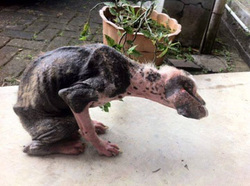 A stray puppy (BAWA image)
A stray puppy (BAWA image)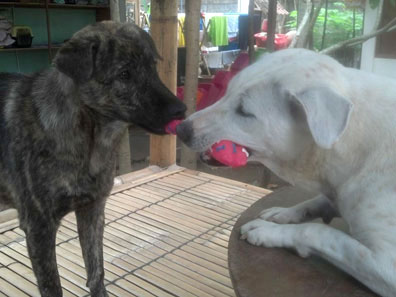 Villa Kitty has a few dogs too! Here, Ridley and Stella duel over a doomed toy.
Villa Kitty has a few dogs too! Here, Ridley and Stella duel over a doomed toy.
UPDATE: Digital Camera Drive to Benefit Bali Dog Rescues
As you may remember, CDR launched a used digital camera drive this winter to benefit dog rescue groups working in Bali, where many dogs suffer tremendously on a daily basis and the need is really critical. CDR sent the first shipments of digital cameras to BAWA and BARC this past month, along with a donation of spare collars and leashes for BAWA (also desperately needed).
Today, CDR received the following e-mail update from BAWA:
Our US office received the cameras and leads, collars and so on and is sending them on to us in Bali gradually to avoid Customs problems.
We received the first camera last week and it was such an exciting day at the office with our people being genuinely amazed and so very grateful for your generosity and thoughtfulness. Now, everyone wants to be a photographer … and that’s great!
Apart from the very practical use to which we can put the cameras, just the first one has been an incredible boost to morale with people saying: Someone in the US sent this to BAWA … Wow!
I really can’t describe the impact. The leads etc are also wonderful for our needs right now.
We were unbelievably touched. Your donations do make a BIG difference! Please continue to bring or send in any unused digital cameras you have lying around the house, and we will continue to send them to Bali.
Thanks for your support!
